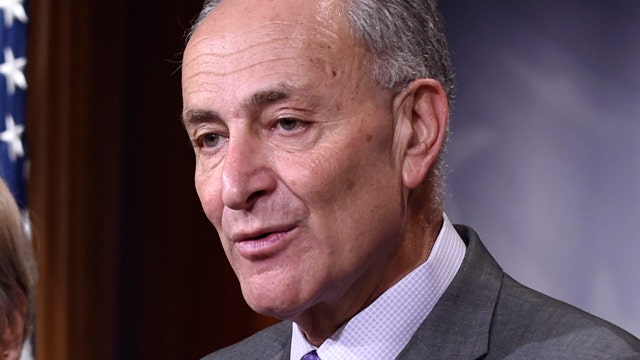Bias Bash: How Schumer's vote affects Iran deal
Judy Miller reacts to Sen. Schumer and Rep. Engel opposing deal
Two more Democratic defections over the Iran nuclear deal have exposed deep divisions at the top echelons of the party just as lawmakers entered the August congressional recess, putting added pressure on President Obama to lock down support ahead of a vital vote next month.
In the middle of the Republican presidential debates Thursday night, senior Democratic Sen. Chuck Schumer issued a lengthy and detailed statement announcing his opposition to the deal.
"To me, the very real risk that Iran will not moderate and will, instead, use the agreement to pursue its nefarious goals is too great," Schumer, D-N.Y., said. "Therefore, I will vote to disapprove the agreement."
The news came as Rep. Eliot Engel, D-N.Y., the top Democrat on the House Foreign Affairs Committee, took the same stance.
The announcements came just hours after two other Senate Democrats -- New York's Kirsten Gillibrand and New Hampshire's Jeanne Shaheen -- announced their support for the international accord. Schumer and Engel also are at odds with the Democrats' likely presidential nominee, Hillary Clinton, who has cautiously embraced the deal. The Senate's No. 2 Democrat, Dick Durbin of Illinois, supports the accord and has been working hard to persuade lawmakers to do the same. So does top House Democrat Nancy Pelosi.
On Friday, Secretary of State John Kerry said "I profoundly disagree" with Schumer and Engel.
But their opposition, coupled with that of other Democratic lawmakers, means the administration still has its work cut out to be able to sustain an expected presidential veto when Congress returns and votes on the agreement.
Republicans, who control the House and Senate, are uniformly opposed to the deal, meaning its fate likely hinges on whether both chambers could muster the two-thirds majority needed to override a veto. So far, the administration has secured the backing of more than a dozen Senate Democrats and more than two dozen House Democrats.
Obama, who delivered a hard-hitting address earlier this week in defense of the deal, shows no signs of letting up in his administration's lobbying effort.
Despite taking heat from Republicans after that speech for comparing their position to that of Iranian hard-liners chanting "Death to America," Obama on Friday stood by his criticism.
He said what the two groups have in common is that they're "satisfied with the status quo." Speaking on CNN, he said hardliners are opposed to any cooperation with the international community, and Republicans have an "ideological commitment" to not getting a deal done.
Republican Senate Majority Leader Mitch McConnell has called on Obama to retract his comments, calling them offensive.
In announcing his opposition, Schumer said he found a potential 24-day delay before inspections could take place "troubling" and noted that the agreement does not allow for "anytime, anywhere" inspections of Iranian nuclear facilities or a unilateral demand for inspections by the U.S.
While Schumer said he is opposing the deal, which would curb Iran's nuclear program in exchange for billions of dollars in sanctions relief, he signaled that he wouldn't lobby hard against the accord.
"There are some who believe that I can force my colleagues to vote my way," he said. "While I will certainly share my view and try to persuade them that the vote to disapprove is the right one, in my experience with matters of conscience and great consequence like this, each member ultimately comes to their own conclusion."
Engel followed Schumer's announcement with his own statement shortly afterward.
Engel echoed Schumer's concerns over inspecting Iran's nuclear facilities. "It is the largest state sponsor of terror in the world and continues to hold American citizens behind bars on bogus charges," Engel said. "Its actions have made a bad situation in a chaotic region worse."
The Associated Press contributed to this report.





